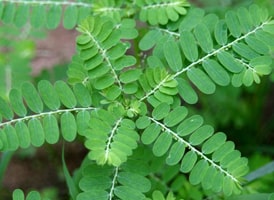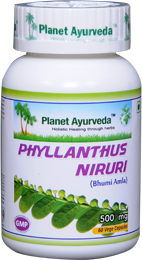Phyllanthus niruri
Chanca piedra is the Spanish name for Phyllanthus niruri. In other words, it means ‘stone breaker’ or ‘shatter stone’. Bhumyamlaki is the Sanskrit name of the wonderful hepatoprotective herb Phyllanthus niruri. Due to its anti-hepatotoxic property, Phyllanthus niruri capsules are widely recommended to enhance the function of the diseased liver. Its roots, leaves, fruits and the whole plant is used as an herbal supplement. Phyllanthus niruri capsules contain standardized herbal extract of the whole plant, known as Bhumyamlaki or Bhumiamla. “Bhumi” means “earth” and “amla” are “small berries”. Bhumiamla is a small plant growing on earth and having small berries. That’s why the name Bhumiamla capsules. It is also called Bhumyamalaki.
According to Ayurveda, it is considered acrid, cooling and alexipharmic. Phyllanthus niruri capsules are useful in thirst, bronchitis, leprosy, anemia, urinary discharge, asthma and acts as a diuretic. It also improves immunity.
It is a widespread tropical plant commonly found in coastal areas. This plant belongs to the leaf-flower genus of family Phyllanthaceae.
Ayurvedic properties of Bhumiamalaki – Bhumiamla or Phyllanthus niruri

It is bitter, astringent and sweet in the post digestive effect i.e. vipaka and has cold potency i.e. virya. The herb alleviates kapha and pitta doshas and possesses light (laghu) and dry (ruksa) properties.
- Botanical name – Phyllanthus niruri
- Common Name – A stonebreaker, Phyllanthus
- Marathi – Bhui amla, Bhui avla
- Hindi – Jangli amlai, Bhumi amla
- Kannada – Nelanelli, Bhu nelli
- Urdu – Bhumiamala
- Tamil – Kilanelli
- Telugu – Nela usiraka
- Spanish – Chanca piedra
Properties of Phyllanthus niruri
- The herb contains flavonoids, terpenoids, alkaloids, polyphenols, lignans, tannins, saponins and coumarins.
- Therapeutic properties of the phytochemicals in Phyllanthus have been proved in a number of clinical trials.
- It possesses hepatoprotective, anti-hepatitis B, anti-HIV and anti-hypertensive properties.
- The plant has been used for centuries as an herbal remedy for urinary calculi.
- It reduces the risk of stones in individuals prone to the condition.
- This medicinal herb is stomachic and useful in chronic dysentery.
- The fresh root of this herb is believed to be an excellent remedy for jaundice.
- The milky juice of this herb is a good application to offensive sores.
Chemical Constituents in Phyllanthus niruri
- The bark yields a bitter principle phyllanthin.
- The active compounds phyllanthin and hypophyllanthin are present in the leaves.
- Most recently, other compounds such as lignansniranthin, nirtetralin and phyltetralin have been isolated from the leaves.
- The seed oil contains ricinoleic acid (1.2), linoleic (21.0) and linolenic (51.4%) acids.
- A new flavone glycoside has been isolated and characterized as fisetin – 4-O- glucoside.
Phyllanthus niruri and Ayurveda
- It is one of the herbs mentioned in most ancient scriptures of Ayurveda.
- Phyllanthus niruri is also known as tamalaki, bahupatra, uttama etc.
- Maharishi Charaka has categorized it as ‘kasahara’. It alleviates cough and svasahara relieves asthma.
- It has been cited in Ayurvedic textbooks that bhumyamlaki is a good appetite stimulant.
- According to Ayurveda, it is digestant, laxative and a liver stimulant.
- It is beneficial in cough, asthma, jaundice, malaria and enlargement of liver.
Hepatoprotective property of Phyllanthus niruri
- During the last decade, Phyllanthus has attracted the attention of researchers all over the world, because of its hepatoprotective activity.
- All forms of viral hepatitis have pathology of acute inflammation of the entire liver.
- Hepatic cell necrosis is associated with leucocytes and histolytic reaction.
- Five different varieties of viral hepatitis are known but major ones are Hepatitis A and Hepatitis B.
- Phyllanthus niruri has shown clinical efficacy in Viral Hepatitis B.
- The effect of this herb on chronic carriers of Hepatitis – B – virus has been clinically studied.
- In a preliminary study, carriers of Hepatitis – B – virus were treated with the preparation of Phyllanthus niruri for 30 days. About 60% of the treated patients have lost Hepatitis B surface antigen when tested 15-20 days after the end of the treatment.
Uses of Phyllanthus niruri
- The whole plant juice has been used for medicinal purpose.
- Internally, it is beneficial in gastrointestinal ailments like loss of appetite, constipation, hyperacidity and excessive thirst.
- It also helps in the treatment of diarrhea and dysentery.
- The decoction of Phyllanthus augments the liver functions.
- It is used as a blood purifier in hepato-splenomegaly conditions.
- In women, menorrhagia and leucorrhea is effectively treated with this herb.
- Phyllanthus is useful in urinary diseases, diabetes and chronic fever.
- The excessive thirst due to pitta vitiation is alleviated with this herb.
- It can also be used as a general tonic in debility.
- This herb possesses a mild diuretic activity and thus it is useful as an adjunct in the treatment of dysuria.
Dosage – It is recommended to take 1-2 capsules twice daily with plain water after meals.
To buy Phyllanthus niruri, please visit store.planetayurveda.com/products/phyllanthus-niruri.

